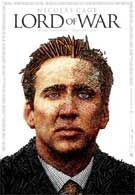Nicolas Cage has had a long, broad career playing a wide variety of characters. He’s played good guys, bad guys, good guys who turn bad, bad guys who turn good, and just about every other variation you can think of. As a serious actor who manages to bring a genuine touch of truth to most of his performances, he’s a good centerpiece to build a film like Lord of War around.
Cage is not only the main character for Lord of War, but, since the entire film is told from his perspective, he’s also the narrator of the film, which means his voice and emotion serve as our guide through the events of the movie and really set the pace for the story on screen. As such, the film is truly dependent upon Cage’s abilities, which takes a little getting used to. The first half hour or so feels like it drags a bit. As I adjusted to a narrated movie flow (instead of having the events unfold without a narration) the pacing got better, making a big difference by allowing that extra touch of character that comes with an internal dialog to come into play.
In Lord of War, Cage plays Yuri Orlov, a Ukrainian immigrant who discovers that, like doctors and morticians, human beings will always have a need for people who sell guns. Yuri shares with us his whole story, from his first experience with a gun sale through his monumental heights, to his inevitable downfall. As he tells us at the beginning, he doesn’t try and sugar coat the story; he knows he’s not the best representative of the human race. Although Yuri first attempts to break into the legal market of arms dealings, competitors like Simeon Weisz (Ian Holm) make that near impossible, forcing Yuri to resort to black and (Yuri’s favorite) “gray” markets.
As with all rich men, Yuri surrounds himself with people who are eventually affected by his chosen career. This includes his parents and his trophy wife, model Ava Fontaine (Bridget Moynahan) - Yuri’s dream girl since age ten. While the story of Yuri finally getting together with Ava is an interesting one, it turns to sorrow as the realization comes that Yuri discusses his arms deals and weapons with more passion and emotion then he uses to talk to his wife.
However, the first to fall to Yuri’s world of corruption is his own brother, Vitaly (Jared Leto) who initially serves as a business partner but eventually succumbs to a cocaine addiction. Sadly this means Vitaly spends most of the movie coked up, or just plain crazy, the result of the only real difference between the two Ukrainian boys: a conscience. Vitaly has one, Yuri doesn’t, and so Vitaly turns to drugs to hide from the consequences of their sales. Jared Leto brings that same honesty to his character as Cage, although the two offer a huge contrast between Vitaly’s regret and Yuri’s passion. It’s no mistake that Vitaly disappears for long stretches of the film while Yuri gets so involved in his business. During these times, the conscience of the movie becomes FBI Agent Jack Valentine (Ethan Hawke). Unlike Vitaly, who is haunted by his actions, Yuri is simply chased by a conscious which never seems able to keep up with his skill in deception.
While the bulk of the movie relies on Cage’s formidable abilities, writer/director Andrew Niccol deserves praise for the movie’s story, dialog, and visual style. The most original credit sequences since School of Rock shows the audience just how much money is in weapons as we see just how many hands a single bullet passes through on its trip from creation to its eventual, destructive use. Just as enjoyable is the movie’s dialog, with some great banter and quotable gems including my personal favorite: “that’s the trouble with falling in love with a dream girl… they have a habit of becoming real.” It’s just another lesson that Yuri learns the hard way, beautifully summed up by Niccol’s writing and Cage’s heartfelt delivery.
The one big issue I have with the Lord of War is a political message literally tacked on to the end of the film. The entire movie is about Yuri’s questionable business, and the ethics behind selling guns: is it just a business, or does the seller bear some responsibility in what happens with those weapons? Vitaly sees the responsibility, Yuri doesn’t. The two performances form a great debate in the movie without being forceful, creating thoughtful material to consider once the movie is over. Unfortunately by tossing in a couple of closing title screens the film changes to a specifically overt point of view by attempting to place the blame on a particular. Personal politics aside, it’s a disappointing move from a movie that achieved so much until those last thirty seconds.
Lord of War is not a comedy or an action flick as the trailers sometimes try to portray it. Some of those elements are in it, but at its core it’s a deep morality play, lead by one of Hollywood’s most honest and sincere performers. Even with a forced political motive shoved in at the end, Lord has a decent message to deliver.
Most Popular



